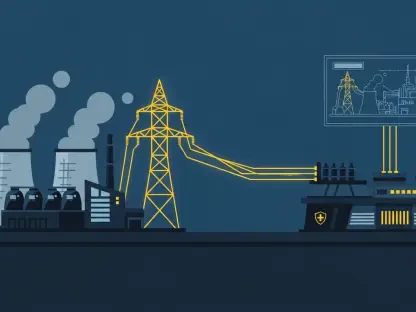In a striking confrontation between technological advancement and public welfare, Senate Democrats have sharply criticized the White House’s approach to the rapid expansion of AI data centers under the Trump administration. A pointed letter signed by five senators—four Democrats and one Independent—has brought to light what they describe as “sweetheart deals” with major tech companies like Meta, Google, Oracle, and OpenAI. This controversy transcends mere innovation, delving into the heart of who bears the burden as utility costs climb and critical resources such as water and electricity face unprecedented strain. The senators argue that these arrangements favor corporate giants at the expense of ordinary Americans, spotlighting a growing tension between the demands of cutting-edge technology and the basic needs of households. This issue has ignited a broader debate over energy policy, consumer rights, and the role of government in balancing progress with equity.
Corporate Favoritism Under Scrutiny
The core of the senators’ grievances lies in the perceived favoritism shown by the administration toward Big Tech firms. They contend that the rapid approval and construction of AI data centers have been prioritized without sufficient oversight or planning for the consequences on local communities. These deals, often shrouded in secrecy, appear to place corporate profits above public interest, leaving citizens to grapple with the indirect costs of such unchecked expansion. The lack of clear guidelines or public consultation in these agreements has raised significant concerns about whether the government is adequately safeguarding the needs of its constituents against the influence of trillion-dollar corporations. This situation has prompted calls for greater transparency to ensure that the benefits of technological growth are not disproportionately skewed toward a select few.
Beyond the issue of favoritism, the senators highlight a troubling absence of accountability in how these projects are managed. They have demanded detailed explanations from White House officials regarding the specific impacts of data center developments on local infrastructure and resources. Questions linger about the legal frameworks underpinning these partnerships and whether they include provisions to mitigate harm to everyday Americans. The push for clarity is not merely a procedural concern but a fundamental demand for fairness, as families across the nation feel the pinch of policies that seem to cater to industry giants. This growing frustration underscores a critical need to reassess how such significant technological initiatives are rolled out.
Rising Energy Demands and Grid Challenges
AI data centers are notorious for their immense energy consumption, and the senators warn of a dramatic escalation in national power usage tied to these facilities. Projections suggest that the share of energy consumed by these centers could surge from 5% to 12% within the next three years, a statistic drawn from the administration’s own AI Action Plan. This rapid increase places enormous stress on the already burdened electrical grid, creating a competitive environment where households find themselves vying with massive corporations for access to basic electricity. The resulting strain is not just a technical issue but a deeply personal one, as families face the real risk of service disruptions or escalating costs that outpace their ability to pay. This dynamic paints a stark picture of inequality in resource allocation.
The ripple effects of this energy surge are already evident in the form of rising utility bills across the country. As data centers consume vast amounts of power to fuel complex AI computations, the demand drives up prices for everyone connected to the grid. The senators argue that this creates an unfair burden on consumers who have little control over the decisions leading to such outcomes. Unlike tech giants with deep pockets, ordinary households cannot absorb these additional costs without significant hardship. This disparity raises pressing questions about how to manage the energy needs of emerging technologies without sacrificing the stability of essential services for the broader population. The urgency of addressing this imbalance cannot be overstated as the digital economy continues to expand.
Energy Policy Shifts and Cost Implications
A significant point of contention for the senators is the administration’s pivot away from renewable energy sources in favor of traditional options like coal, natural gas, and nuclear power. They criticize policies that have reduced support for wind and solar—often seen as more cost-effective and faster to implement—through measures such as increased tariffs on energy infrastructure and the elimination of key tax credits. This strategic shift, they argue, not only slows the transition to sustainable energy but also contributes to a mounting cost-of-living crisis by keeping utility prices high. With household energy costs already up by 10% since the start of the year, the impact of these decisions is felt directly in the budgets of American families struggling to keep up.
Further compounding the issue is the long-term economic outlook tied to these energy choices. The senators point out that prioritizing non-renewable sources risks locking the nation into higher costs and environmental degradation over time. For instance, expanding liquefied natural gas exports could lead to substantial price increases for domestic consumers in the coming decades. This approach stands in stark contrast to the potential of renewables to offer more stable and affordable energy solutions. The divergence in policy vision reflects a deeper ideological divide about how best to meet modern energy demands while protecting vulnerable populations from financial strain. The debate over these priorities continues to shape the national conversation on technology and sustainability.
Economic Impact on American Households
At the heart of the senators’ critique is the profound economic toll on American families resulting from the unchecked growth of AI data centers. They assert that it is unjust for ordinary households to effectively subsidize the infrastructure of Big Tech through soaring electricity bills. The contradiction between campaign promises to reduce utility costs and the current reality of price increases has only heightened public frustration. Families are not only facing higher costs but also the indirect consequences of strained resources, such as water supplies impacted by the massive cooling needs of these facilities. This situation underscores a fundamental inequity in how the costs of technological advancement are distributed across society.
Moreover, the economic burden extends beyond monthly bills to broader implications for quality of life. As utility expenses consume a larger share of household budgets, many families are forced to cut back on other essentials, exacerbating financial stress. The senators argue that this outcome is a direct result of policies that fail to account for the needs of the average consumer in the rush to accommodate corporate interests. Addressing this imbalance requires a reevaluation of how infrastructure projects are funded and who ultimately pays the price for progress. Without intervention, the gap between those who benefit from AI advancements and those who bear the costs will likely widen, deepening existing economic disparities.
Accountability and the Call for Transparency
In response to these mounting concerns, the senators have taken a firm stance in demanding accountability from key government bodies. They have directed pointed inquiries to the Office of Science and Technology Policy and the Department of Commerce, seeking specifics on how data centers contribute to rising utility costs and the nature of agreements with tech companies. This push for detailed information reflects a broader desire to ensure that the public is not left in the dark about decisions affecting their daily lives. The questions also probe whether any compensatory measures are planned for households grappling with steep bill increases, highlighting the need for tangible relief alongside policy reform.
The call for transparency is not just about uncovering past actions but also about setting a precedent for future technological expansions. The senators emphasize that balancing the growth of AI with fairness to consumers requires open dialogue and clear accountability mechanisms. Without such measures, the risk of repeating these challenges with each new wave of innovation remains high. This demand for answers signals a critical moment in shaping how the nation navigates the intersection of technology and public welfare. As this debate unfolds, it becomes a pivotal chapter in the ongoing struggle to align progress with equity, leaving a lasting imprint on policy discussions. Moving forward, stakeholders must prioritize solutions that distribute the benefits and burdens of innovation more evenly, ensuring that no one is left behind in the race for advancement.









